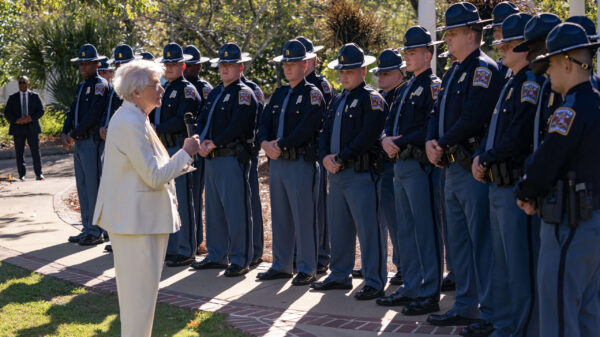By Bill Britt
Alabama Political Reporter
MONTGOMERY—Many questions remain about the steps which have led to the statewide scandal now engulfing Governor Bentley’s Administration.
Why did Baron Coleman, once a fierce critic of Speaker Mike Hubbard, come to his aid?
Why were Gov. Bentley and his senior advisor, Rebekah Caldwell Mason, so adamant that ALEA Chief, Spencer Collier not provide an affidavit stemming from Coleman’s actions?
Currently, there are more questions than answers as to why Gov. Bentley and Rebekah Mason “punished,” and ultimately fired ALEA Chief Spencer Collier.
Over the last several months, after speaking with dozen of individuals with knowledge of the events, an approximate timeline will perhaps shade some light on the situation that now threatens to topple the Bentley Administration, under the weight of scandal and perhaps illegal conduct.
The following timeline is drawn from interviews with law enforcement officers, attorneys, politicos, and our own alreporter.com staff.
This dramatic chain of events begins with Hubbard as the central figure, leads to the firings at ALEA, the exposing of Bentley’s infidelities, eventually resulting in, what is now believed to be an ongoing criminal investigation.
Coleman, a radio host and attorney, went to the ALEA office on Jan.11, 2016, asking to speak with Collier, saying he could only trust “Secretary Collier.” Coleman said he had information about criminal conduct or possible public corruption, according to those with knowledge of his visit.
Collier was out of the office due to a serious back injury, but returned to the office because of the serious nature of Coleman’s accusations. Coleman expressed that he was worried about being seen at ALEA, so he was placed in an unmarked area that houses ALEA’s Fusion Center and Intelligence Operation.
That day, Coleman first met with Collier, and his second in command, JT Jenkins. During that meeting, Coleman informed them that he had information he believed would show that the lead prosecutor in the Hubbard case, Deputy Attorney General Matt Hart, had violated Alabama’s Grand Jury secrecy law by leaking information to Coleman (Trial Judge Jacob Walker, III, would later find that Coleman’s accusation was false). After meeting with Collier and Jenkins, it was agreed that Coleman would be interviewed by Special Agent Jack Wilson, that same day. Special Agent Wilson, after meeting with Coleman, opened a Probable Cause Investigation.
The following day, January 12, Collier and Jenkins met with ALEA Attorney Michael Robinson, and asked for a review of Alabama Grand Jury Secrecy laws. Robinson concluded, that it was his legal opinion, that the secrecy laws did not apply in this case. The Governor was informed that SBI Intelligence was conducting a Probable Cause investigation, but initial analysis by the ALEA Legal Unit found no grounds for Coleman’s allegations.
On February 2, Coleman signed an affidavit for Hubbard, accusing Hart of prosecutorial misconduct.
Coleman had previously testified before Judge Walker that he had no knowledge of Hart violating the Grand Jury Secrecy Act. His affidavit was used as grounds to reopen court proceedings on prosecutorial misconduct, which further delayed Hubbard’s trial date.
On February 4, two days after giving Hubbard his affidavit, Coleman once again met with Agent Wilson. Later that day, Wilson informed Collier and Jenkins that the accusations made by Coleman were baseless, and he recommended the Probable Cause investigation be closed.
After closing the Coleman investigation, it was determined that it would be proper for ALEA to cooperate with the Attorney General’s Office, because of the false accusations being raised by Hubbard’s defense.
It is believed, a day later, on February 5, ALEA Executive Counsel Jason Swann conferred with the Attorney General’s Office. At issue was whether Collier and Wilson would provide testimony, or an affidavit concerning the false accusations made by Coleman. It was determined that affidavit would be provided.
On February 8, Collier, Wilson, and Swann met with Gov. Bentley and his Chief Legal Advisor, David Byrne. During the meeting, Bentley was informed of ALEA’s operation with the Attorney General’s Office. It was at this meeting that Bentley told Collier and Wilson to lie about the investigation into Hart. Those present remember Bentley saying, “Just tell Hart y’all are still investigating.”
In subsequent days, Swann and Byrne, in cooperation with the Attorney General’s Office, drafted the affidavit that would later be presented as evidence in the March evidentiary hearing on prosecutorial misconduct in the Hubbard case.
On February 15, Bentley called Collier to ask why he and Wilson had signed the affidavit, contrary to his “suggestion” to lie? The next day Collier, Jenkins, Chief of Staff Hal Taylor, and Swann were ordered to come to Bentley’s office. Also present were David Byrne, Jennifer Ardis, Rebekah Mason, and Joe Espy, the Governor’s personal attorney.
Those present recall the tongue-lashing they received from Bentley and Mason, because Collier and Wilson had provided affidavits to the Attorney General’s Office. Sensitive law enforcement information was also discussed at the meeting, something that law enforcement agents have since said was very inappropriate.
Less than 30 minutes after the meeting, al.com reporter Chuck Dean phoned Swann, asking for a statement as to why Collier and Wilson had signed the affidavit contrary to Bentley’s orders? According to those with knowledge of the call, Dean was fully aware of the details of the private meeting held in Bentley’s office.
The following morning on February 17, Collier was summoned to Bentley’s office where he was placed on medical leave. Collier was informed the Governor had already spoken with Dean, giving him an exclusive that Collier was being “punished” for disobeying his order. Dean’s story was published at 2:15pm that afternoon.
At the meeting, Collier made recommendations as to who would be best suited to be his replacement. Stabler was not one of the names suggested by Collier, but Bentley said Stabler was his guy, and wanted him to head the organization. At the time, outside law enforcement believed Stabler was being sent to ALEA to find a reason to fire Collier.
After the Dean report, and the Monday massacre reported by this publication, outside law enforcement ramped up a full investigation into Bentley and Mason.
Bentley’s perceived inappropriate meddling into law enforcement matters has triggered an ever-widening investigation into possible actions taken by Bentley and Mason, with regards to the illegal use of State or campaign resources.
Collier learned about his termination on March 22, through social media, he said at a news conference on March 23. This is also when details of the Bentley/Mason affair came to light.
Since Collier’s press conference, Bentley and Mason have been under siege by the media, and under investigation by State and Federal law enforcement agencies according to sources close to the investigation.
Mason resigned her post as senior advisor, but continues to serve as Bentley’s chief advisor, and some say, only real counsel.
What began with an effort by Coleman to aid Hubbard, has resulted in firestorm of personal loss, and public disgrace.
Most believe Bentley will not survive the scandal that has rocked the State, whether through impeachment, or indictment, Bentley’s time as Head of State is rapidly coming to an end some believe.




















































